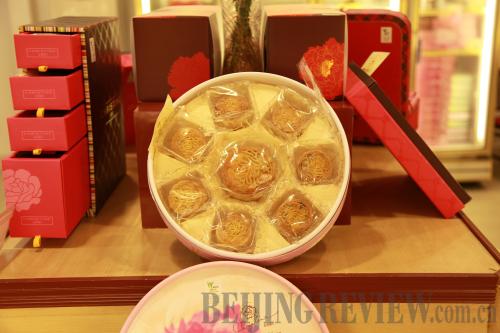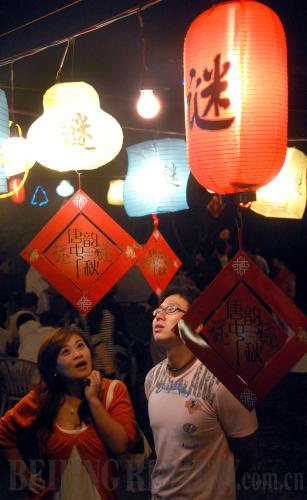|
 |
|
FESTIVAL FEAST: Moon cakes—the traditional food during the Mid-Autumn Festival (GU HUAFENG) |
Exceptions existed in regions where men also worshipped the Moon. After worship, all the family members ate moon cakes and enjoyed the Moon together. Then it was time for elders to tell children stories about the Moon. As time passed, the customs of moon worship also changed. Now people only enjoy the Moon and eat delicious moon cakes during the festival.
In ancient times, moon cakes were mostly home-made. The housewife usually cut moon cakes and divided them among family members. She needed to count carefully the number of people in the family to ensure every member, present or not, would receive a piece.
Moon cakes are often sent to relatives and friends to express they are missed and to bless them with a good harvest, happiness and longevity.
Besides enjoying the Moon and eating moon cakes, people in different places of China also hold various activities with diverse local characteristics to celebrate the festival.
In Zhejing Province, people flock to the banks of the Qiantang River to watch a spectacular surging tide. In many places, the festival is celebrated with colorful lanterns. In some areas, people make lanterns from oranges, and hang them outside their doors.
In Beijing, a toy called Grandpa Rabbit is popular during the festival. In Chinese legend, the rabbit is a fairy, indefatigably pounding medicine on the Moon. The toy is made from clay and comes in assorted shapes, varying from 10 cm to 1 meter in height. The rabbit has a white face, wears a golden helmet, dresses in combat attire, carries small flags on its back and rides on a large animal such as a tiger, deer, lion or camel. Sometimes, the rabbit sits on a lotus flower.
Burning firewood in a tower-shaped structure is also popular. Smaller towers are built of tiles, and larger ones of bricks. Through an opening on top of the tower, fuel such as wood, bamboo and husks are fed into the fire on the evening of the festival. Competitions are held in some places where those who can heat bricks or tiles to a burning red color are the winners.
People in Hong Kong celebrate the festival with Fire Dragon Dance, and the Gaoshan ethnic group in Taiwan with Ball Dance.
 |
|
RIDDLING: Visitors to the Mid-Autumn Festival celebration in Shanghai's Guilin Park try to solve a riddle attached to a lantern (CFP) |
During the festival, people in antiquity also paid sacrifice to the God of Earth, whose birthday was said to fall on the same day of the Mid-Autumn Festival. Autumn is also a harvest season, so people like to thank the God of Earth for producing crops. Coastal people also offered sacrifices to the sea on that day.
In ancient times, the festival was also a time for people to pray for more children. Since a calabash has many seeds, people believed it would bless them with babies, and hang it on one end of their beds. During the festival, people would give various melons to others as mascots.
No matter how it is celebrated, the Mid-Autumn Festival is a happy time for all Chinese.
Story About Chang'e
It is said there were 10 suns in the sky in ancient times, which scorched all crops and made people's lives miserable. A hero named Hou Yi shot down nine suns, leaving the last for the people.
Hou Yi had a beautiful and kind wife named Chang'e. One day, he received an elixir from the Empress of Heaven. It was said that after taking the medicine, one would ascend immediately to Heaven and become an immortal.
One day, when Hou Yi went hunting, Peng Meng, one of his disciples, sword in hand, forced Chang'e to hand over the elixir. Realizing she would be unable to defeat Peng Meng, Chang'e made a snap decision. She took out the elixir and swallowed it. As soon as she did so, her body floated off the ground and flew out of the window—toward Heaven. Chang'e settled down on the Moon, the place in Heaven closest to Earth.
When Hou Yi returned home at dusk, he learned from the maids about what had happened. Shocked and furious, Hou Yi looked up into the night sky and called out the name of his beloved wife when, to his surprise, he found there was a moving figure exactly like his wife on the Moon.
Hou Yi then had an incense table arranged in the back garden that Chang'e loved, putting her favorite food and fresh fruits on the table to express his affection for his wife. When people heard the story about Chang'e, they also set incense tables in the moonlight and prayed for her.
The author is a folklorist and senior editor with Beijing-based Academy Press | 